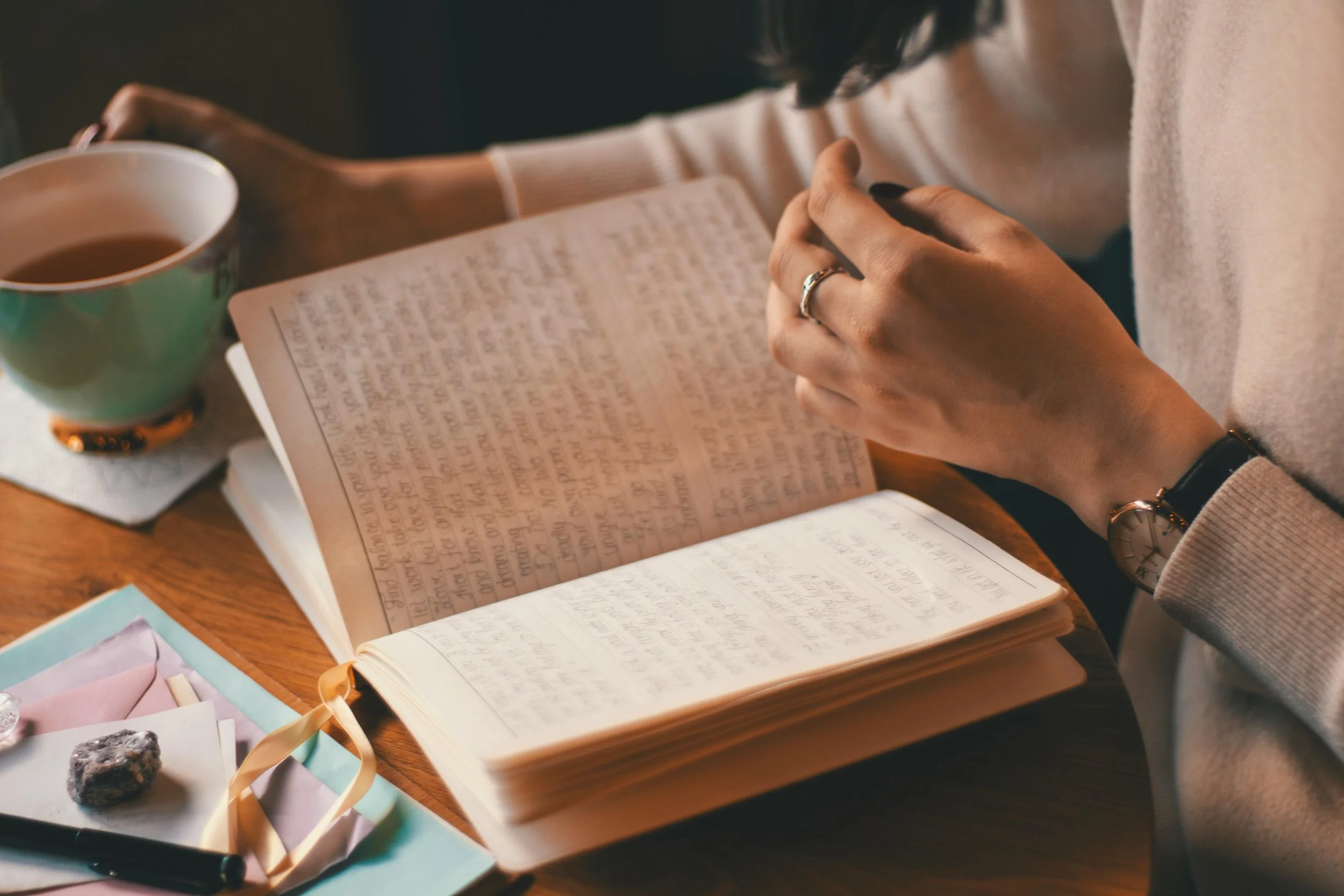A guide to keeping a journal
Always wanted to be the kind of girl who’s outwardly unproblematic, but leaves the function early to go home and bitch about everyone in her journal? Daniella Parete Clarke explains how to keep a journal
Photo by Alina Vilchenko on Pexels
Joan Didion described those who keep private notebooks as “lonely and resistant rearrangers of things, anxious malcontents, children afflicted apparently at birth with some presentiment of loss”.
Despite this unflattering portrait, Didion herself was a prolific notebook-keeper, and the quote comes from a 1968 essay in which she advocates the practice. She goes on to write that the “point” of keeping a notebook is to capture what things felt like, rather than cataloguing facts. “Remember what it was to be me,” she writes. “That is always the point.”
Didion contrasts her own writings with “diary entries” – she finds the latter dull and, in retrospective readings, nonsensical. It’s a compelling distinction. Perhaps if I had encountered the essay earlier, I would have been able to keep a journal as a teenager; I similarly struggled to see the point in recounting the trivial events of my days.
Last year, I embarked on the programme prescribed by Julia Cameron in her creative self-help book The Artist’s Way. Cameron instructs readers to write “morning pages”: three sides of unfiltered thoughts, by hand, after waking.
The method inspired in me an appreciation for journalling, a personal development that seems to align with a wider trend. Many blocked creatives are returning to Cameron’s text, or encountering “morning pages” for the first time; others are attempting to journal as part of their New Year’s resolutions.
Starting from scratch can feel daunting, but there are plenty of ways to engage in the practice. After consulting a range of experts and seasoned journal-keepers, I’ve compiled a comprehensive guide, with tips and insights to help first-timers.
Where to begin
Considering why you want to keep a notebook is a good first step, according to Melissa Legere, a therapist and co-founder of California Behavioral Health. “Journalling is an easily accessible and powerful tool that can have a positive impact on your overall wellbeing – as long as you do it consistently and with intention,” she says.
For Didion, the “point” of journaling was to allow her to recall who she was at various moments throughout her life. But the intention varies for different people, and depends on personal aims. A notebook presents an opportunity to write out tasks and reflect on experiences: difficult, or, as licensed sexologist Sofie Roos recommends, venereal, in a designated sex journal.
“There’s something about writing down a problem that makes coming up with solutions so much easier”
Writing down thoughts is a “safe outlet”, says Legere, to express and process emotions privately and track personal growth. “This can be really calming, and help you better understand yourself,” she says.
This approach works for Chris Naccarelli, a therapist and clinical manager for mental-health service Calm Pittsburgh. “I've been journalling pretty steadily since 2017,” he tells me. “I'm someone who is a slow thinker – ‘well read’ but not always ‘well said’. I initially sought out journaling as a way to work on this.”
Like Legere, Chris believes “the essence of journalling is exploration, and to reach an understanding of oneself”.
What to write in a journal
There is perhaps nothing more intimidating than the blank page. Even those who come armed with determination, measurable goals, and a new Leuchtturm1917 can falter when deciding what exactly to commit to paper.
Chris initially tried “the ‘mind-dump’ method – sitting before the paper and simply bleeding”. Amelia Reynolds, Sextras’ own deputy sex editor, takes a similar approach in her writing sessions: “My entries are mostly stream-of-consciousness. I just let the words come out, not giving myself the chance to edit.”
Dr Thompson Maesaka, the owner of neurological-rehab clinic The Neural Connection, tells me this is a common and often effective technique. “The easy way is to start writing anything you think; just let the pen move and then read what you’ve written,” he says.
“Some people use it like they would a close friend: a means to vent out all the negativity. Others use it as a start to the day, prioritising tasks and making a to-do list.”
Chris has also tried the to-do list style – jotting down tasks as succinct bullet-points. “It becomes boring for me to regurgitate the day at night, or create a list in the morning,” he notes, “but these have merits, and can help with memory retention.”
The free-flowing approach is a favourite of Legere’s; she says it can combat overthinking. “Don’t think too hard about it or try to make it perfect. Just write whatever comes to mind... even if it feels messy,” she says.
Michelle English, a licensed clinical social worker and co-founder of Healthy Life Recovery, agrees: “This technique helps people to untie a knot in their thoughts and feelings.” Other options include reflection journaling and using prompts.
“Start with self-interrogating questions like, ‘what am I thankful for today?’ ‘What is something I would like to work on?’” she suggests.
If all else fails? “Set a timer for five minutes and jot down all the thoughts that come to your mind without self-criticism,” English says. “Remember this is your space, so there are no rules.”
Read more: I aligned my wellness routine to my star sign - this is what happened
When should you journal?
In her book, Cameron asserts that writing in the morning is “the primary tool of creative recovery”. It expels, she believes, all the worries, hang-ups and blocks that prevent creative impulses from flourishing throughout the rest of the day.
Caleb Backe, a wellness expert for skin- and hair-care brand Maple Holistics, tells me that he managed to incorporate journalling into his life by making it a morning ritual. “Initially, it was difficult to maintain the discipline to journal everyday,” he says. “But now it's just part of my routine. In fact, I need it in order to take on the day ahead.”
As an Artist’s Way fan, I favour Cameron’s idea of removing mess from the mind, and her endorsement of self-discipline. But some find an evening brain dump more fruitful, or don’t feel inclined to take on such an uncompromising schedule.
“I normally journal at night, but I’m kind of fluid with it,” Amelia says. “If I feel motivated or there’s something I want to work through, I’ll write whenever. I used to be pretty strict with it – I aimed for at least a page every night. Then I realised that putting those rules on it turned it into a chore that made me less likely to do it.
“Now I write whenever I feel moved to do so. I know for some people it’s a key part of their day or routine, but regimenting journal time doesn’t work for me.”
More wellness: Why (and how) you should be living in harmony with the moon
Less important than a specific time slot is choosing a moment when you can focus and think. “Maybe that's first thing in the morning, or right before you go to bed; these moments are often quieter and give you a chance to reflect without distractions,” Legere says.
“Try not to do it in the middle of a hectic day, because that can make it harder to tap into your thoughts. Pick a calmer time – you’ll get more out of the experience.”
Can journaling change your life?
Churning out three pages of longhand in the AM “will change you”, says Cameron. But does it always change you for the better? Not everyone enjoys or notices improvements from engaging in a daily journalling habit.
“Journalling is an activity that takes a certain immobility, a stillness”
“The topic creates controversy in my clients,” Chris tells me. “Some love it, others hate it. The latter often cite it as not being helpful, which, I wonder, is just another way of saying it didn't lead to a synthesis of thoughts or feelings of catharsis. Perhaps they're people who are constantly in motion. Journalling is an activity that takes a certain immobility, a stillness.”
Most of the experts are confident it’s worth trying, even – or especially – if it feels alien to your current lifestyle. There are many forms to discover that could change your perspective. A recent trend on YouTube has seen creators celebrating “commonplace books” – popular in the Renaissance period – in which you compile lyrics, quotes, drawings, recipes and ideas.
“Our minds are full of clutter, and this makes it difficult to process feelings – especially negative ones,” says Caleb. “There's something about writing down a problem that makes coming up with solutions so much easier. It’s been amazing for my mental health; I’ll even go as far as to say it’s been life changing for me. It’s my secret weapon when dealing with stress and anxiety.”
Can journalling improve your mental health?
All the therapists I spoke to agreed the practice can lead to improved mental wellness. “One of my clients grappled with chronic anxiety, and found that keeping a gratitude journal helped to ‘rewire’ their thought patterns towards positivity,” English shares. “Another client is processing the grief of losing a loved one by using a journal to write letters they couldn't send – a therapeutic act that has given them closure.”
And most of the therapists and mental-health specialists who recommend journalling to their clients practise what they preach. “My last breakthrough allowed me to notice a pattern of imagining confrontations with people that usually never came to be,” says Maesaka.
“These daydreams almost always resulted in me feeling frustrated and the other person being unaware I was upset. To stop torturing myself, I realised I needed to get better at having hard conversations in real life.”
Amelia says taking up the habit has had a huge impact on her: “I’ve become pretty attached to my journal, I feel comforted when I write in it. It’s a tool for self-regulation and reflection, and although this can be difficult and uncomfortable, I always feel better afterwards. It’s like a pressure release when there are too many things in my head, I can write them down and free up space.”
“I read entries back, sometimes to give myself a laugh or just out of curiosity,” she says. “I think I’ll enjoy reading it when I’m older.”


